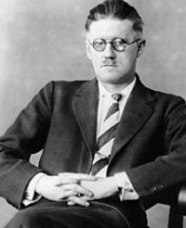Tone
the manner in which an author expresses his or her attitude; the intonation of the voice that expresses meaning. (Remember that the “voice” need not be that of the poet.) Tone is described by adjectives, and the possibilities are nearly endless. Often a single adjective will be enough, and tone may change from stanza to stanza or even line to line. Tone is the result of allusion, diction, figurative language, imagery, irony, symbol, syntax, and style.
Nightpiece
James Joyce
Gaunt in gloom
The pale stars their torches
Enshrouded wave.
Ghostfires from heaven’s far verges faint illume
Arches on soaring arches,
Night’s sindark nave.
Seraphim
The lost hosts awaken
To service till
In moonless gloom each lapses, muted, dim
Raised when she has and shaken
Her thurible.
And long and loud
To night’s nave upsoaring
A starknell tolls
As the bleak incense surges, cloud on cloud,
Voidward from the adoring
Waste of souls.
The tone of this piece by James Joyce is one of many layers. With each line comes a different expressed attitude. The beginning introduces a descriptive voice. However, towards the middle the author’s attitude becomes wry and melancholy as a result of the stark realization of depravity and desperation. The overall tone of the piece is somber and resentful. The dark nightfall encompassed in the poem holds with it a deep emotion, leading to these melancholy terms that describe the voice of the author.

"A man's errors are his portals of discovery." ~James Joyce
James Joyce

James Joyce was born into a well-off Catholic family in Dublin, the eldest of a dozen children, but unfortunately they slid into poverty. He attended first the boarding school Clongowes, then the day-school Belvedere, and finally the Royal University. At Belvedere he adored writing essays parodying various literary styles. By the end of his university years he had rejected Catholicism in favour of literature. He experimented with prostitutes as a teenager university, and later with alcohol.
After completing college he went to Paris, supposedly to study medicine, butinstead squandered his family’s money. He returned from Paris after a few months, when his mother was diagnosed with cancer and after she died, he began to drink heavily, and conditions at home grew quite appalling. He made some money reviewing books, teaching, and singing.
In February 1904 he started writing a long fictionalised autobiography called "Stephen Hero". In June 1904 he met Nora Barnacle, a chambermaid whose earthy good-humor suited him better than the higher-class, educated girls he had known. They ran off to Europe together in October 1904, after Joyce had a falling-out with Oliver Gogarty. Gogarty became 'Buck Mulligan' in "Ulysses", but Joyce has concealed the story of their falling out.James and Nora ended up in Trieste and Pola, Austria, where they spoke Italian. For want of money James wrote and taught English, and worked briefly in a bank, but his brother Stanislaus ended up paying a lot of their bills.
The years of 1906-07 were a turningpoint; the writing of "The Dead", conceiving Ulysses and deciding to rewrite "Stephen Hero". In 1909 and 1912, James visited Ireland, first trying to arrange publication of "Dubliners", later supervising the construction of Dublin's first movie house, the Volta. During this trip, Joyce was devastated to hear that Nora had not been a virgin when they eloped. She assured him via post that this was untrue.
Between 1914 and 1920, Joyce's fortunes gradually improved as his writing gained attention and he found wealthy patrons.Ezra Pound deserves the most credit for recognizing Joyce's talent. When circumstances allowed, Joyce was the most disciplined of writers, working long, productive days using an elaborate system of notetaking. Through the 1920s and 1930s, Joyce's lavish lifestyle in Paris was supported by his patroness Harriet Weaver. The banning of "Ulysses" (published 1922) turned Joyce into a household name. Joyce's eyesight grew worse and worse, with occasional reverses through surgery. He spent 1922 to 1939 writing "Finnegans Wake". Tragically his daughter Lucia went mad and had to be institutionalized and in Joyce finally married Nora in 1931. He died unexpectedly in 1941.
(http://www.dublintourist.com/literary_dublin/james_joyce.shtml)
